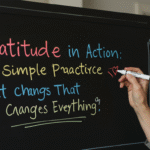Mindset Transformation
Have you ever noticed how easy it is to get caught up in negative thinking? Like, when one thing goes wrong, it almost feels like the whole world is crashing down. You spill your coffee, you miss a deadline, or someone cuts you off in traffic—and suddenly, it can feel like everything is off track. It’s pretty natural to focus on what’s not going well, right? It’s like our brains are wired to pay more attention to problems because, historically, it helped us survive. But the thing is, our brains don’t know how to filter out the small, good stuff, so we end up fixating on the negative.
But here’s the kicker: gratitude is actually a powerful tool to rewire how we think. Like, when you make it a practice to actively focus on things you’re thankful for—no matter how small—it gives your brain a totally different lens to look through. Instead of being stuck in that negative loop, you begin to shift your focus onto things that are working in your favor.
For example, let’s say you’re going through a rough week. Maybe work is stressful, you’re feeling drained, and everything feels like a bit of a struggle. But then, you take a moment to think about what you’re grateful for. Maybe it’s something simple like, ‘I have a roof over my head,’ or ‘I got a really nice message from a friend today.’ Maybe you’ve got a cozy spot to sit and relax, or you’ve just had a good meal. It doesn’t matter how small the thing is—it’s about shifting your attention to what is working, instead of what’s not.
Here’s why that’s so powerful. Studies have shown that practicing gratitude can literally change the structure of your brain. There’s this part of the brain called the prefrontal cortex—it’s the part of the brain that handles decision-making, behavior regulation, and overall perspective. When you focus on things you’re grateful for, you activate this part of your brain in a positive way, and it helps you make more balanced decisions, feel less stressed, and even boost your mood.
In fact, research by Dr. Robert Emmons, one of the leading experts in the field of gratitude, has shown that people who regularly practice gratitude experience higher levels of well-being, less anxiety, and even better physical health. It’s not just about feeling happy in the moment—gratitude actually makes your brain more resilient to stress.
A big part of this is that gratitude increases your capacity for positive emotions, which helps you bounce back from challenges more easily. When you’re constantly in a state of thankfulness, even during tough times, your overall mental health improves because you’re less likely to get stuck in that cycle of negative thinking.
Now, you might be thinking, “Yeah, but what if I don’t feel grateful right now? What if things are really tough?” That’s totally valid. Gratitude isn’t about ignoring the hard stuff—it’s about acknowledging it and then intentionally looking for moments of relief, hope, or peace, even in small forms. It’s about finding balance.
Here’s a simple trick that works for a lot of people: You could try keeping a gratitude journal. Every day (or even just a few times a week), write down three things you’re grateful for. The key is to make it specific, like: ‘I’m grateful for the walk I took this morning because the weather was perfect’ or ‘I’m grateful for a good conversation with my coworker.’ That specificity makes the feeling of gratitude more real and tangible. Over time, this can train your brain to start noticing the good things more naturally.

Another way to practice gratitude is through gratitude meditation or just taking a few minutes each day to close your eyes and reflect on what you appreciate in your life. I mean, even just pausing for a second and thinking, “Wow, I’m lucky to have this cup of coffee right now. It’s warm, smells amazing, and gives me a little moment of peace.” It sounds small, but that shift in perspective can really change how you feel. Reference
And then there’s the social side of gratitude. Ever noticed how powerful it is when someone just says ‘thank you’ or gives you a genuine compliment? When we show gratitude toward others, it strengthens our relationships and creates a sense of connection. If you take a minute each day to thank someone—a friend, a colleague, or even a stranger—it helps build a more positive environment around you.

What I love about gratitude is that it’s contagious. When you start practicing it, you start noticing that other people are more appreciative too. It’s like this ripple effect, where the more gratitude you show, the more it spreads to the people around you.
At the end of the day, it’s all about perspective. Life’s ups and downs aren’t going to go away, but when you start noticing what you’re grateful for, it doesn’t make the tough moments any less difficult—it just gives you a little more balance to handle them. You start seeing the world through a lens of abundance, rather than scarcity, which makes everything feel a bit more hopeful.
So, what do you think? Could you see yourself starting a gratitude practice? Even if it’s just something simple, like jotting down one thing you’re grateful for before bed?
Explore more of our articles on Gratitude here







